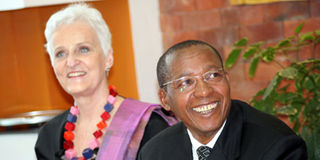No changes to Kenya tribunal bill, says Kilonzo

Justice minister Mutula Kilonzo (right) and Netherlands ambassador Laetitia van den Assum during celebrations to mark the Kenya National Commission on Human Rights sixth anniversary on July 29, 2009. He said he will table the draft tribunal bill before the Cabinet on Thursday without any changes. Photo/ PHOEBE OKALL
What you need to know:
- Justice minister says he will not accept to table a watered down version of the bill to Parliament.
- The bill goes before Cabinet a third time on Thursday.
The bill seeking to establish a local tribunal to try post-election violence perpetrators will be tabled before the Cabinet on Thursday without any changes to the recommendations.
Justice minister Mutula Kilonzo has maintained that he will not amend the recommendations he has made to the government as it tries to meet the September 30 deadline for the formation of the tribunal.
Speaking at celebrations marking six years since the formation of the Kenya National Commission on Human Rights, the minister said he would not accept to table a watered down version of the bill to Parliament.
“We want a transparent legal system and I have no intention to step back from the recommendations I have made to the government on the formation of the tribunal. There are no clauses to amend and even if there was, I wouldn’t amend,” said Mr Kilonzo.
He said with anything less than what has already been recommended, the tribunal would not adhere to international best practices for the trial of the crimes it is expected to handle.
“So long as the arguments being advanced are being made by people who do not know the set standards, I have no intention whatsoever to change any clauses (in that bill),” he added.
The Mbooni MP said that the current bill had already taken care of the views expressed after the rejection of an earlier attempt to have it passed by Parliament in February.
The bill goes before Cabinet a third time on Thursday.
“I’ll try tomorrow (Thursday). Pray for me to convince the Cabinet of the need to form a wholly Kenyan process,” said Mr Kilonzo, adding he is ‘ready to go to Ocampo if Cabinet refuses him to go to Parliament.’
Louis Moreno Ocampo is the prosecutor of the International Criminal Court at the Hague, in the Netherlands.
The Justice minister said the suggestion that the establishment of a division of the High Court to try the perpetrators of the violence is ‘self-defeating.’
Under the International Crimes Act, said Mr Kilonzo, the High Court would have the power to try the suspects but Kenya cannot do that since it would require an amendment of the constitution to enable it try crimes committed before it came into effect.
The International Crimes Act was assented to by Kenya in December 2008 and came into effect in January 2009, meaning that the crimes committed from December 2008 to February 2009 cannot be tried under that act.
Among the contentious issues that led to the adjournment of the last Cabinet meeting was a clause that removes the president’s immunity from prosecution if the local tribunal is established.
Mr Kilonzo said that by assenting to the Rome Statute, which led to the establishment of the International Criminal Court, the president had already accepted the removal of his immunity.
That is bound to create difficulties in today’s meeting that some powerful PNU ministers had criticised the bill a week ago on the same grounds.
A state that is party to the Rome Statute, cannot use immunity resulting from one’s official positions as a defence against their prosecution for crimes against humanity.
According to an agreement between Kenya and the chief prosecutor of the International Criminal Court, Mr Luis Moreno-Ocampo, Kenya has until September 30 to set up a credible court to try the suspects or refer their cases to The Hague.
Mr Kilonzo said it would be a mistake not to pass the bill, adding that to do so would surrender the country to the level of a failed state.
A Hague trial is regarded as bad for Kenya’s image because the country will be ranked alongside collapsed states such as Sierra Leone and the Democratic Republic of the Congo which do not have proper legal mechanisms or are not stable enough to try suspects at home.
Kenya was recently ranked 14th in the list of failed states by a US think tank, Fund for Peace, out of 20 countries considered to be critical in the “failed state” category.
The Justice minister said Kenya could top the list once the cases are taken over by the ICC.



